大学英语A级语法大全--精选.docx
- 格式:docx
- 大小:93.24 KB
- 文档页数:20
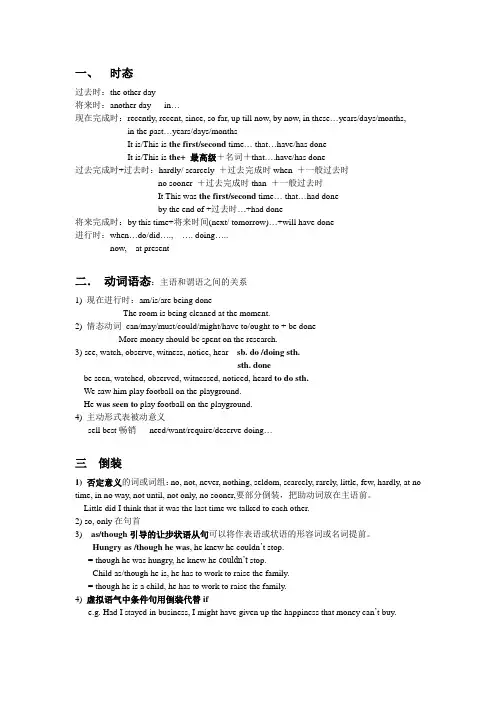
一、时态过去时:the other day将来时:another day in…现在完成时:recently, recent, since, so far, up till now, by now, in these…years/days/months, in the past…years/days/monthsIt is/This is the first/second time… that…have/has doneIt is/This is the+ 最高级+名词+that….have/has done过去完成时+过去时:hardly/ scarcely +过去完成时when +一般过去时no sooner +过去完成时than +一般过去时It This was the first/second time… that…had doneby the end of +过去时…+had done将来完成时:by this time+将来时间(next/ tomorrow)…+will have done进行时:when…do/did…., …. doing…..now, at present二.动词语态:主语和谓语之间的关系1) 现在进行时:am/is/are being doneThe room is being cleaned at the moment.2) 情态动词can/may/must/could/might/have to/ought to + be doneMore money should be spent on the research.3) see, watch, observe, witness, notice, hear sb. do /doing sth.sth. donebe seen, watched, observed, witnessed, noticed, heard to do sth.We saw him play football on the playground.He was seen to play football on the playground.4) 主动形式表被动意义sell best畅销need/want/require/deserve doing…三倒装1) 否定意义的词或词组:no, not, never, nothing, seldom, scarcely, rarely, little, few, hardly, at no time, in no way, not until, not only, no sooner,要部分倒装,把助动词放在主语前。

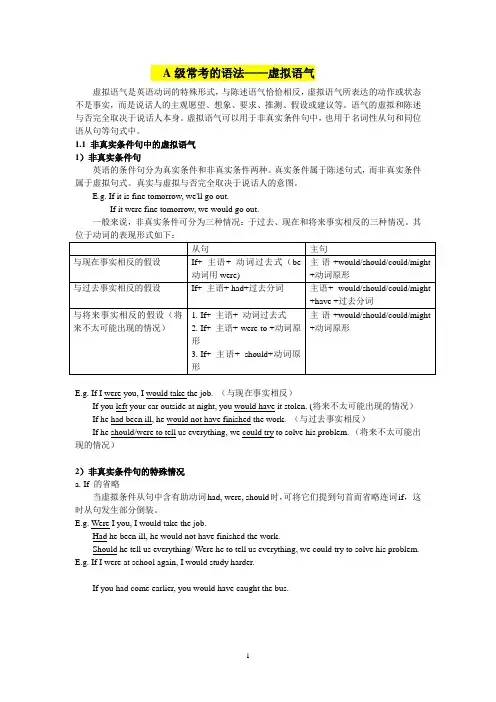
A级常考的语法——虚拟语气虚拟语气是英语动词的特殊形式,与陈述语气恰恰相反,虚拟语气所表达的动作或状态不是事实,而是说话人的主观愿望、想象、要求、推测、假设或建议等。
语气的虚拟和陈述与否完全取决于说话人本身。
虚拟语气可以用于非真实条件句中,也用于名词性从句和同位语从句等句式中。
1.1 非真实条件句中的虚拟语气1)非真实条件句英语的条件句分为真实条件和非真实条件两种。
真实条件属于陈述句式,而非真实条件属于虚拟句式。
真实与虚拟与否完全取决于说话人的意图。
E.g. If it is fine tomorrow, we'll go out.If it were fine tomorrow, we would go out.一般来说,非真实条件可分为三种情况:于过去、现在和将来事实相反的三种情况。
其位于动词的表现形式如下:从句主句与现在事实相反的假设If+ 主语+ 动词过去式(be动词用were) 主语+would/should/could/might +动词原形与过去事实相反的假设If+ 主语+ had+过去分词主语+ would/should/could/might+have +过去分词与将来事实相反的假设(将来不太可能出现的情况)1.If+ 主语+ 动词过去式2.If+ 主语+ were to +动词原形3.If+ 主语+ should+动词原形主语+would/should/could/might+动词原形E.g. If I were you, I would take the job. (与现在事实相反)If you left your car outside at night, you would have it stolen. (将来不太可能出现的情况)If he had been ill, he would not have finished the work. (与过去事实相反)If he should/were to tell us everything, we could try to solve his problem. (将来不太可能出现的情况)2)非真实条件句的特殊情况a.If 的省略当虚拟条件从句中含有助动词had, were, should时,可将它们提到句首而省略连词if,这时从句发生部分倒装。
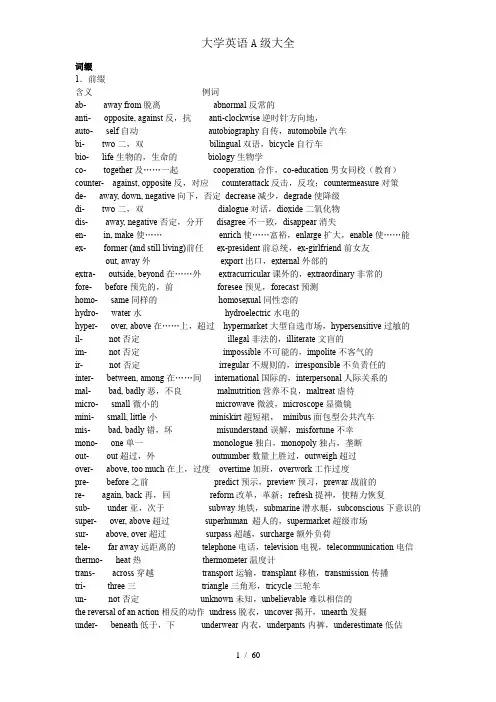
词缀1.前缀含义例词ab- away from脱离abnormal反常的anti- opposite, against反,抗 anti-clockwise逆时针方向地,auto- self自动 autobiography自传,automobile汽车bi- two二,双bilingual双语,bicycle自行车bio- life生物的,生命的biology生物学co- together及……一起cooperation合作,co-education男女同校(教育)counter- against, opposite反,对应 counterattack反击,反攻;countermeasure对策de- away, down, negative向下,否定decrease减少,degrade使降级di- two二,双dialogue对话,dioxide二氧化物dis- away, negative否定,分开 disagree不一致,disappear消失en- in, make使……enrich使……富裕,enlarge扩大,enable使……能ex- former (and still living)前任 ex-president前总统,ex-girlfriend前女友out, away外 export出口,external外部的extra- outside, beyond在……外 extracurricular课外的,extraordinary非常的fore- before预先的,前foresee预见,forecast预测homo- same同样的 homosexual同性恋的hydro- water水hydroelectric水电的hyper- over, above在……上,超过hypermarket大型自选市场,hypersensitive过敏的il- not否定illegal非法的,illiterate文盲的im- not否定 impossible不可能的,impolite不客气的ir- not否定 irregular不规则的,irresponsible不负责任的inter- between, among在……间 international国际的,interpersonal人际关系的mal- bad, badly恶,不良 malnutrition营养不良,maltreat虐待micro- small微小的 microwave微波,microscope显微镜mini- small, little小 miniskirt超短裙,minibus面包型公共汽车mis- bad, badly错,坏misunderstand误解,misfortune不幸mono- one单一 monologue独白,monopoly独占,垄断out- out超过,外 outnumber数量上胜过,outweigh超过over- above, too much在上,过度overtime加班,overwork工作过度pre- before之前 predict预示,preview预习,prewar战前的re- again, back再,回 reform改革,革新;refresh提神,使精力恢复sub- under亚,次于subway地铁,submarine潜水艇,subconscious下意识的super- over, above超过superhuman 超人的,supermarket超级市场sur- above, over超过surpass超越,surcharge额外负荷tele- far away远距离的 telephone电话,television电视,telecommunication电信thermo- heat热thermometer温度计trans- across穿越 transport运输,transplant移植,transmission传播tri- three三triangle三角形,tricycle三轮车un- not否定unknown未知,unbelievable难以相信的the reversal of an action相反的动作 undress脱衣,uncover揭开,unearth发掘under- beneath低于,下underwear内衣,underpants内裤,underestimate低估uni- one单一uniform一致的,unilateral单方的vice- in place of代理的,副的 vice-president(大学)副校长,vice-chairman副主席2.后缀-able/-ible capable of, suitable for能够 respectable值得尊敬的,possible可能的-ee one who (passive)人(动作的承受者)employee雇员,examinee考生,trainee学员-en make使……成为strengthen加强,lengthen使变长,broaden加宽-er one who, that which人 employer雇主,examiner主考人,trainer教练员-fold times倍数twofold两倍的,tenfold十倍的-free without没有ice-free不冻的,duty-free免关税的-ful having the quality of具有……性质 respectful恭敬的,successful成功的-hood state, quality表示身份,状况 manhood男子汉气概,childhood童年-ish having the quality of(negative) childish孩子气的,girlish女孩似的具有……性质(贬义)-ism state, quality, act; doctrine,system capitalism资本主义,communism 共产主义表示行为,社会信仰,学说-less without没有careless粗心的,useless无用的-like having the quality of有……性质的 childlike孩子般的,天真的;warlike好战的-proof against防……,耐…… waterproof防水的,fire-proof防火的-some having the quality of有……倾向的 tiresome使人疲劳的,troublesome令人讨厌的-ware product, goods产品,商品 software软件,glassware玻璃器皿A级冲刺-重点短语动词发表于:2010-06-17 20:22 | 分类:英语资料阅读:(0) 评论:(0) 重点短语动词所谓短语动词,就是动词加小品词构成的起动词作用的短语。
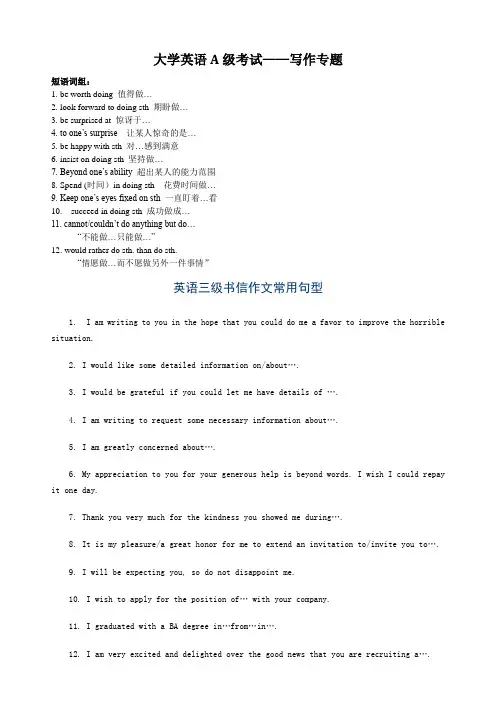
大学英语A级考试——写作专题短语词组:1. be worth doing 值得做…2. look forward to doing sth 期盼做…3. be surprised at 惊讶于…4. to one’s surprise 让某人惊奇的是…5. be happy with sth 对…感到满意6. insist on doing sth 坚持做…7. Beyond one’s ability 超出某人的能力范围8. Spend (时间)in doing sth 花费时间做…9. Keep one’s eyes fixed on sth 一直盯着…看10. succeed in doing sth 成功做成…11. cannot/couldn’t do anything but do…“不能做…只能做…”12. would rather do sth. than do sth.“情愿做…而不愿做另外一件事情”英语三级书信作文常用句型1. I am writing to you in the hope that you could do me a favor to improve the horrible situation.2. I would like some detailed information on/about….3. I would be grateful if you could let me have details of ….4. I am writing to request some necessary information about….5. I am greatly concerned about….6. My appreciation to you for your generous help is beyond words. I wish I could repay it one day.7. Thank you very much for the kindness you showed me during….8. It is my pleasure/a great honor for me to extend an invitation to/invite you to….9. I will be expecting you, so do not disappoint me.10. I wish to apply for the position of… with your company.11. I graduated with a BA degree in…from…in….12. I am very excited and delighted over the good news that you are recruiting a….三级作文常考类型介绍信说明:你是大学教授王平,你的学生张刚即将毕业,毕业后拟到你的朋友Smith先生学校继续深造,攻读硕士学位。
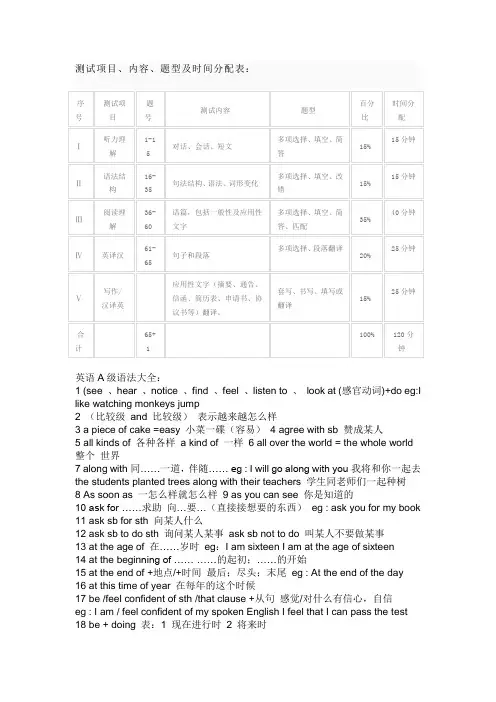
英语A级语法大全:1 (see 、hear 、notice 、find 、feel 、listen to 、look at (感官动词)+do eg:I like watching monkeys jump2 (比较级and 比较级)表示越来越怎么样3 a piece of cake =easy 小菜一碟(容易)4 agree with sb 赞成某人5 all kinds of 各种各样a kind of 一样6 all over the world = the whole world 整个世界7 along with同……一道,伴随…… eg : I will go along with you我将和你一起去the students planted trees along with their teachers 学生同老师们一起种树8 As soon as 一怎么样就怎么样9 as you can see 你是知道的10 ask for ……求助向…要…(直接接想要的东西)eg : ask you for my book11 ask sb for sth 向某人什么12 ask sb to do sth 询问某人某事ask sb not to do 叫某人不要做某事13 at the age of 在……岁时eg:I am sixteen I am at the age of sixteen14 at the begin ning of …… ……的起初;……的开始15 at the end of +地点/+时间最后;尽头;末尾eg : At the end of the day16 at this time of year 在每年的这个时候17 be /feel confident of sth /that clause +从句感觉/对什么有信心,自信eg : I am / feel confident of my spoken English I feel that I can pass the test 18 be + doing 表:1 现在进行时2 将来时19 be able to (+ v 原) = can (+ v 原)能够…… eg : She is able to sing She can sing20 be able to do sth 能够干什么eg :she is able to sing21 be afraid to do (of sth 恐惧,害怕…… eg : I'm afraed to go out at night I'm afraid of dog22 be allowed to do 被允许做什么eg: I'm allowed to watch TV 我被允许看电视I should be allowed to watch TV 我应该被允许看电视23 be angry with sb 生某人的气eg : Don't be angry with me24 be angry with(at) sb for doing sth 为什么而生某人的气25 be as…原级…as 和什么一样eg : She is as tall as me 她和我一样高26 be ashamed to 27 be away from 远离28 be away from 从……离开29 be bad for 对什么有害eg : Reading books in the sun is bad for your eyes 在太阳下看书对你的眼睛不好30 be born 出生于31 be busy doing sth 忙于做什么事be busy with sth 忙于……32 be careful 当心;小心33 be differen t from…… 和什么不一样34 be famous for 以……著名35 be friendly to sb 对某人友好36 be from = come from 来自eg :He is from Bejing He comes from Bejing Is he from Bejing ? Does he come from Bejing ?37 be full of 装满……的be filled with 充满eg: the glass is full of water the glass is filled with water38 be glad+to+do/从句39 be going to + v(原)将来时40 be good at(+doing) = do well in 在某方面善长, 善于……41 be good for 对什么有好处eg : Reading aloud is good for your English42 be happy to do 很高兴做某事43 be helpful to sb 对某人有好处eg : Reading aloud is helpful to you 大声朗读对你有好处Exercising is helpful to your bady 锻炼对你的身体有好处44 be in good health 身体健康45 be in trouble 处于困难中eg : She is in trouble They are in tronble46 be interested in 对某方面感兴趣47 be late for = come late to 迟到eg: Be late for class 上课迟到48 be like 像…… eg : I'm like my mother49 be mad at 生某人的气50 be made from 由……制成(制成以后看不见原材料)51 be made of 由……制成(制成以后还看得见原材料) 52 be not sure 表不确定53 be on a visit to 参观54 be popular with sb 受某人欢迎55 be quiet 安静56 be short for 表**的缩写eg: 陶is short for 陶俊杰57 be sick in bed 生病在床58 be sorry to do sth be sorry for sb eg : I am sorry for you59 be sorry to hear that 60 be sorry to trouble sb eg : I am sorry to trouble you 61 be strict in doing sth 严于做某事eg : He's strict in obeying noles62 be strict with sb 对某人要求严格eg: Some students are not strict with them selves 这些学生对自己不严格63 be strict with sb in sth 某方面对某人严格64 be supposed to do 被要求干什么65 be sure 表确定66 be sure of doing sth 对做某事有信心eg: He is sure of winning I am sure of learning English well67 be sure of sth 对做某事有信心eg: I'm sure of my head (my teacher 我相信我的大脑(老师)68 be sure that sth 对做某事有信心eg: I'm suer that he can pass the test 我相信他能通过考试69 be sure to do sth一定会做某事eg: We are sure to pass the test 我们一定会通过这次考试We are sure to learn English well 我们一定能学好英语70 be terrified of + 名/动doing 害怕…… 71 be terrified to do sth 害怕做某事72 be the same as … 和什么一样73 be used to doing sth 习惯做某事eg: My father is used to getting up early 我爸爸习惯早He is used to sleeping in class 他习惯上课睡觉74 be worth doing 值得做什么75 be(feel) afraid to do sth 害怕做某事be afraid of sth 害怕某物be afraid that 丛句76 because+句子because of +短语eg : He was late because he had a headache He was late because of his headache77 begin to do = start to do 开始做某事start…with…=begin…with… 以什么开始什么eg : Let's begin the game with the song I begin to go home78 between…and… 两者之间79 borrow sth from sb 向……借…… lend sth to sb ( lend sb sth 借给……什么东西eg : I borrowed a pen from him he lent a pen to me ( he lent me a pen80 both = the same(as) = not different(from) 表相同81 bother 打扰bother sb to do stheg : I'm sorry to bother you ,but can you tell me to way to the station我十分道歉打扰你,但是你能告诉我怎么去车站the problem has been bothering me for weeks 这个问题困扰了我几个周了He's bothering me to lend him money82 by the end of 到……为止83 call sb sth eg : We call him old wang84 care 关心eg : Don't you care about this country's future ?你为什么不关心国家的未来85 catch up with sb 赶上某人86 chat with sb 和某人闲谈take sb to + 地点带某人去某地87 come in 进88 come over to 过来89 come up with 提出eg: Can you come up with a good idea 你能想出一个好办法吗?90 communicate with sb 和某人交流91 consider + doing 考虑做什么eg : Why not consider going to lu zhou 为什么不考虑去泸州?92 dance to 随着……跳舞eg : She likes dancing to the music 她喜欢随着音乐跳舞93 decide to do sth 决定做某事94 do a survey of 做某方面的调查95 do better in 在……方面做得更好96 do wrong 做错97 Don't forget to do sth 不要忘了做某事98 Don't mind+doing /从句/名词不要介意……99 each +名(单)每一个…eg : Each student has many books 每一个学生都有一些书100 end up +doing 101 enjoy +doing喜欢102 escape from 从……逃跑eg: The prisoners have escaped from the prison犯人从监狱里逃跑出来103 expect to do sth 期待做某事104 fall down 摔下来fall off 从哪摔下来105 fall in love with sb /sth 爱上什么106 far from 离某地远eg : The school is far from my home 107 find +it +adj +to do 发现做某事怎么样108 find sb/sth +adj 发现什么怎么样eg : I find the book interesting 109 finish 完成+doing(名词)110 fit to sb = be fit for sb 适合某人111 forget to do 没有做而忘了forget doing 做了而又忘了eg: Don't forget to go home I forget closing door 112 from…to… 从某某到某某eg: From me for her113 get /have sth down 做完,被(别人)做…eg: I have my hair cut 我理了发(头发被剪了)Tom got his bad tooth pulled out 汤母把他的坏牙拔掉了(被牙医拔掉了)114 get a part-time job= find a part-time job 115 get along well with sb = get on well with sb 与某人相处得好116 get along with sb = get on with sb 与某人相处117 get ready for = be ready for为什么而准备eg : I get ready for math I am ready for math 118 get sb in to trouble 给某人麻119 get sb to do sth120 get…from… 从某处得到某物121 give a talk 做报告eg: He is give a tall 122 give sth to sb give sb sth 给某人某物123 go fish 钓鱼go swimming 游泳124 go on to do 去做下一件事go on doing 继续做这件事125 go out away from go out of126 go to school 上学(用于专业的)go to the school 去学校(不一定是上学)127 good way to 好方法128 hate to do 讨厌没做过的事hate doing 讨厌做过的事129 have a party for sb 举办谁的晚会130 have a talk 听报告谈一谈131 have been doing 现在完成进行时eg : You have been talking You have been sleeping since132 have been to …( 地方)……去过某过地方have gone to …(地方)去了某地还没回来133 have fun +doing 玩得高兴134 have sth to do 有什么事要做eg: I have a lot of homework to do 我有很多家庭作业要做I have nothing to do 我没什么事情做135 have to do sth 必须做某事136 have trouble (problem) (in) doing sth 做什么事情有麻烦137 have…time +doing138 have…(时间)…off 放……假eg: I have month off 我请一个月得假139 hear sb +do/doing 听见某人做某事/正在做某事140 help a lot 很大用处141 help sb with sth \one's sth 帮助某人某事(某方面)help sb (to) do sth 帮助某人做某事142 hope to do sth 希望做某事143 How about(+doing) = What about(+doing)144 how do you like = what do you think of 你对什么的看法145 if : 是否=wethereg: I don't know if (wether) I should go to the party 我不知道我是否应该去参加晚会He don't know if (wether) we will arrive on time tomorrow morning 他不知道我们明天早上是否能准时到达146 if :如果,假如(全部接一般时态)+条件语态从句eg: I'll go to LuZhou if it does't rain 假如明天不下雨,我就去泸州If they change the plan they will let me know 假如他们要改变计划,他们会让我知道的I'll go to England ,if I have enough money next year 如果我明年由足够的钱,我就要去英国147 in one's opinion = sb think 某人认为148 in some ways 在某些方面149 in the end = finally(adv) 最后150 in the north of… 什么在什么的北方(north 北 sowth 南 west 西 east 东)。
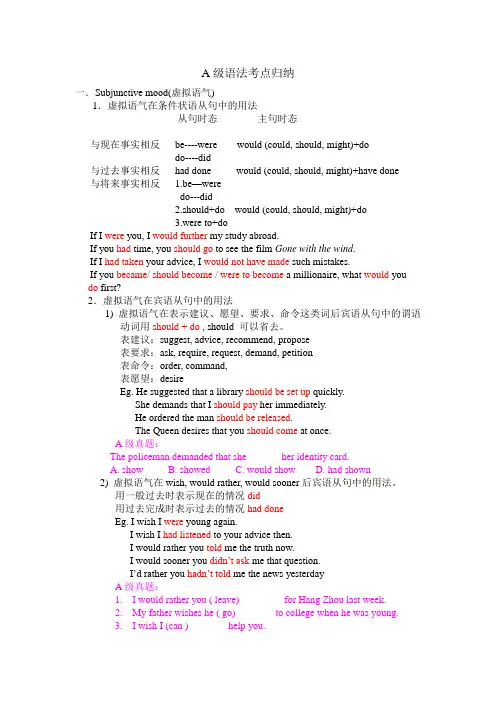
A级语法考点归纳一.Subjunctive mood(虚拟语气)1.虚拟语气在条件状语从句中的用法从句时态主句时态与现在事实相反be----were would (could, should, might)+dodo----did与过去事实相反had done would (could, should, might)+have done 与将来事实相反 1.be—weredo---did2.should+do would (could, should, might)+do3.were to+doIf I were you, I would further my study abroad.If you had time, you should go to see the film Gone with the wind.If I had taken your advice, I would not have made such mistakes.If you became/ should become / were to become a millionaire, what would you do first?2.虚拟语气在宾语从句中的用法1)虚拟语气在表示建议、愿望、要求、命令这类词后宾语从句中的谓语动词用should + do , should 可以省去。
表建议:suggest, advice, recommend, propose表要求:ask, require, request, demand, petition表命令:order, command,表愿望:desireEg. He suggested that a library should be set up quickly.She demands that I should pay her immediately.He ordered the man should be released.The Queen desires that you should come at once.A级真题:The policeman demanded that she ______ her identity card.A. showB. showedC. would showD. had shown2) 虚拟语气在wish, would rather, would sooner后宾语从句中的用法。
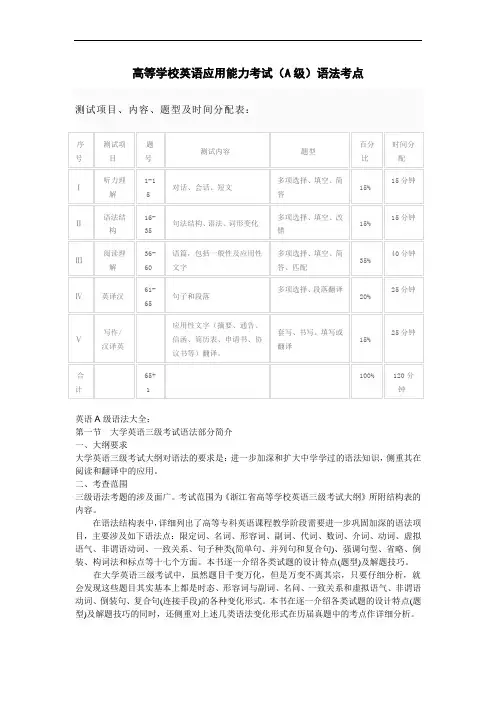
高等学校英语应用能力考试(A级)语法考点英语A级语法大全:第一节大学英语三级考试语法部分简介一、大纲要求大学英语三级考试大纲对语法的要求是:进一步加深和扩大中学学过的语法知识,侧重其在阅读和翻译中的应用。
二、考查范围三级语法考题的涉及面广。
考试范围为《浙江省高等学校英语三级考试大纲》所附结构表的内容。
在语法结构表中,详细列出了高等专科英语课程教学阶段需要进一步巩固加深的语法项目,主要涉及如下语法点:限定词、名词、形容词、副词、代词、数词、介词、动词、虚拟语气、非谓语动词、一致关系、句子种类(简单句、并列句和复合句)、强调句型、省略、倒装、构词法和标点等十七个方面。
本书逐一介绍各类试题的设计特点(题型)及解题技巧。
在大学英语三级考试中,虽然题目千变万化,但是万变不离其宗,只要仔细分析,就会发现这些题目其实基本上都是时态、形容词与副词、名问、一致关系和虚拟语气、非谓语动词、倒装句、复合句(连接手段)的各种变化形式。
本书在逐一介绍各类试题的设计特点(题型)及解题技巧的同时,还侧重对上述几类语法变化形式在历届真题中的考点作详细分析。
最常考点:非谓语动词,虚拟语气,名词性从句,倒装句(部倒),时态,词形转换非谓语动词:近几年的语法测试中非谓语动词约占31。
1%,平均每年近5道题,可谓是语法项目考查的重点,那么非谓语动词的考查都有哪些特点,解答时又应注意些什么呢?下面我和大家就一起来分析一下:1、非谓语动词考查特点1) 谓语动词与非谓语动词的判断对谓语动词与非谓语动词区别的考查主要集中在独立主格结构,如:all things ___ because of the snowstorm,many passengers could do nothing but take the train。
a。
had been canceled b。
have been canceledc。
were canceled d。
having been canceled四个选项中有三个是谓语动词,只有d是非谓语动词,只要同学们能判断出这里是非谓语动词做状语,则不用考虑时态的问题,答案自明。
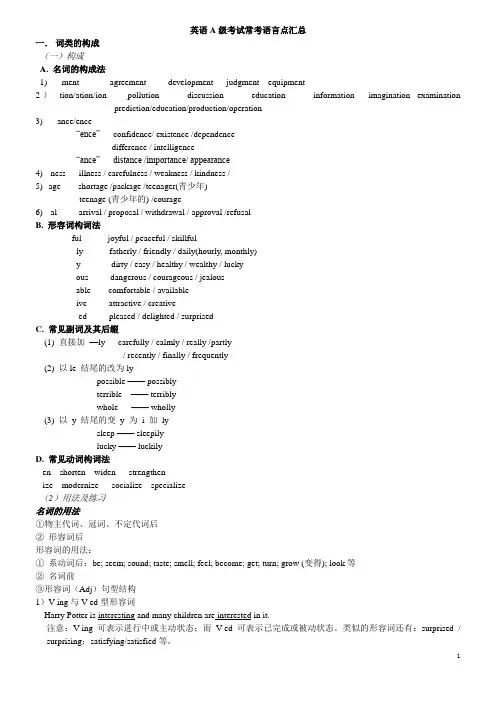
英语A级考试常考语言点汇总一.词类的构成(一)构成A. 名词的构成法1) --ment agreement development judgment equipment2)--tion/ation/ion pollution discussion education information imagination examination prediction/education/production/operation3) --ance/ence--―ence‖confidence/ existence /dependencedifference / intelligence--―ance‖ distance /importance/ appearance4) --ness illness / carefulness / weakness / kindness /5)--age shortage /package /teenager(青少年)teenage (青少年的) /courage6) --al arrival / proposal / withdrawal / approval /refusalB. 形容词构词法--ful joyful / peaceful / skillful--ly fatherly / friendly / daily(hourly, monthly)--y dirty / easy / healthy / wealthy / lucky--ous dangerous / courageous / jealous--able comfortable / available--ive attractive / creative--ed pleased / delighted / surprisedC. 常见副词及其后缀(1) 直接加—ly carefully / calmly / really /partly/ recently / finally / frequently(2) 以le 结尾的改为lypossible —— possiblyterrible —— terriblywhole —— wholly(3) 以y 结尾的变y 为i 加lysleep —— sleepilylucky —— luckilyD. 常见动词构词法-en shorten widen strengthen-ize modernize socialize specialize(2)用法及练习名词的用法①物主代词、冠词、不定代词后②形容词后形容词的用法:①系动词后:be; seem; sound; taste; smell; feel; become; get; turn; grow (变得); look等②名词前③形容词(Adj)句型结构1)V-ing与V-ed型形容词Harry Potter is interesting and many children are interested in it.注意:V-ing可表示进行中或主动状态;而V-ed可表示已完成或被动状态。
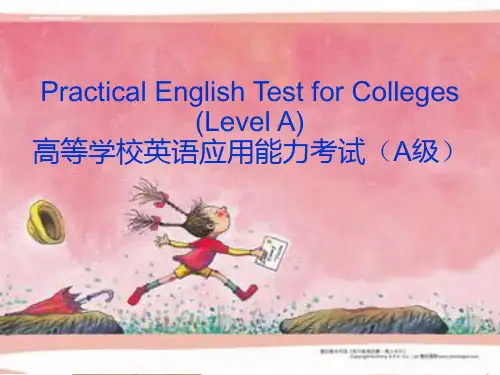
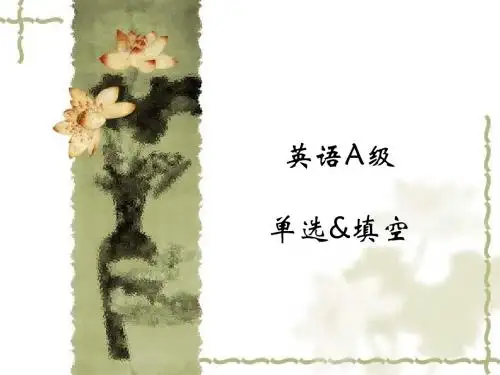
大学英语三级语法大全名词性从句概述名词性从句在句子中起名词作用的句子叫名词从句(Noun Clauses)。
名词从句的功能相当于名词词组, 它在复合句中能担任主语、宾语、表语、同位语、介词宾语等,因此根据它在句中不同的语法功能,名词从句又可分别称为主语从句、宾语从句、表语从句和同位语从句。
引导名词性从句的连接词引导名词性从句的连接词引导名词性从句的连接词可分为三类:连接词:that, whether, if(不充当从句的任何成分)连接代词:what, whatever, who, whoever, whom, whose, which.连接副词:when, where, how, why不可省略的连词:1. 介词后的连词2. 引导主语从句和同位语从句的连词不可省略。
That she was chosen made us very happy.We heard the news that our team had won.比较:whether与if 均为"是否"的意思。
但在下列情况下,whether 不能被if 取代:1. whether引导主语从句并在句首2. 引导表语从句3. whether从句作介词宾语4. 从句后有"or not"Whether he will come is not clear.大部分连接词引导的主语从句都可以置于句末,用it充当形式主语。
It is not important who will go.It is still unknown which team will win the match.名词性wh-从句名词性wh-从句1)由wh-词引导的名词从句叫做名词性wh-从句。
Wh-词包括who, whom,. whose, whoever, what, whatever, which, whichever等连接代词和where, when, how, why等连接副词。
固定搭配The accident was my fault, so I had to pay for the damage _______ the other car.at B) to C) on D) forAlthough he did not feel well, he insisted ______ going there together with us.to B) on C) at D) forYoung _______ he is, he has proved to be an able salesman.That B) who C) as D) which4. ______ his surprise, the manager found nobody in the meeting room.A) at B) To C) For D) WithThis company has two branches: one in Paris and __ in New York.another B)one other C)the other D)otherAs a teacher, you can never be ______ patient with slow students.much B) most C) so D) tooI have a lot of trouble _______ the car.Parking B) for parking C) to park D) parkThe more plugging and weeding, ________ the crops.the better B) the most C) better D) the goodOur company ' s visitors decided to stay in our city for _____ two days as they wanted to have a look around.Other B) the other C) another D) other 'sI think that the Great Wall is worth ____ hundreds of miles to visit.to travel B) traveled C) traveling D) travelThe new staff didn ' t know how to use the system ______ I explained it to him yesterday. until B) if C) because D) sinceAllan is looking forward to ___ his American partner at the trade fair.meet B) be meeting C) meeting D) having metWhen I first arrived in Japan, I was surprised ___ the way people greeted.of B) to C) with D) atMost of the retired people are happy __ their quiet life in the countryside.to B) of C) with D) onSandy made quite a number of (apply) _______________ for a management position but failedevery time.I remember (see) _________ you somewhere before, but i can't tell the exact place.We all felt excited when china succeeded in (launch) ____________ its first manned spaceship.We regret to inform you that we no longer manufacture the product you are (interest) in.Virtually all the members were in (agree) ______ with the proposal.He used (do) ______ a lot of drinking but has given it up.Strictly (speak) _______ , she was not qualified for the job.Due to the present price level, we cannot help but (adjust) _______ our offer.The engineers spent the whole night (work) ____ on the new device.词形变化Nowadays, electronic (pay) payment is a more convenient way to pay for purchases than cash andchecks.The (grow) growth of online shopping is producing a fundamental change in consumer behavior.It is the (responsible) responsibility of the Human Resources Department to employ new staffmembers.It ' s important to realize how (quick) quickly this disease can spread over the globe.Since we work in different sections of the company, we see each other only (occasional) occasionally.Some domestic manufacturers are busy increasing production, losing the chance to develop more(advance) advanced technology.If your neighbors are too noisy, then you have a good reason to make your (complain) complaint. Yourdaughter is (luck) lucky enough to have been admitted to this large company.After an (introduce) introduction by the chairperson, we ' ll go on with the dayWe must keep the manager (inform) informed of the advertising campaign.The new university graduate is confident of (win) winning the post as the assistant to the managingdirector.Answer:1-5 BBCBC 6-10 DAACB 11-14 ABDC15 applications 16 seeing 17 launching 18interested 20 speaking 21 adjust 22working19 to dos discussion.The local economy depends (heavy) heavily on the exports of manufactured goods.He tried to solve the problem, but he (quick) quickly gave up.It is far more (interest) interesting for me to chat online with friends than to watch TV.Finally the woman found her (lose) lost child with the help of the police.The boss gave him a raise in salary because of his excellent (perform) performance at work.It ' s really (wonder) wonderful to see you here again in Beijing.Obviously, nuclear power can never be the only (solve) solution to energy crisis.Nobody at the meeting would (belief) believe that the new proposal could be carried out smoothly. The lecture was so (bore) boring that many of the students in the classroom fell asleep.Mr. Smith considered (sell) selling his car and his house before moving to Beijing.The government is trying to find a way to deal with the problem of pollution (effective) effectively.With the help of the police, the woman finally found her (lose) lost child after a sleepless night. Sandy made quite a number of (apply) applications for a management position but failed everytime.The graduates had a (cheer) cheerful farewell party before leaving the collage.Although he was (deep) deeply hurt by what she said to him, he made no reply.I 'm not sure whether we can gain any profit from the (invest) investment.The research group has submitted a report, (suggest) suggesting reforms to be made.The organization started a (nation) national campaign against cigarette smoking in public places. Application for this training course should be sent (direct) directly to the admission office.I ' veheard that the musical group will set off for Hong Kong to give a three-day (perform) performance.After the flood, life was (extreme) extremely difficult for the farmers in this area.I cannot go shopping with you because I have an (appoint) appointment with my dentist this afternoon.被动语态As he was required to submit the accounting report before 4:30 pm. the assistant hurried to Mr.Smith office.was requiredhad requiredRequiresRequiredThis hospital, which (equip) is equipped with modern facilities, is one of the best in the country. If the rent is as much as $750 a month, water, gas and electricity should (include) be included. Most of the new models displayed in the car exhibition (design)_were designed in Germany a few years age.At the meeting I made some proposals ,but no one seemed to be (interest) _interested _in them. The people injured in the accident (send) were sent to the nearest hospital for treatment last night. It is reported that the construction of the new subway (complete) will be completed next month. We (impress) were impressed by the high quality and fine workmanship of your products when we visited your factory.Having been badly damaged by the earthquake, the city has to be (rebuild) rebuilt.Employees are not allowed (make) to make personal phone calls in the office.The proposal about the annual sales (discuss) will be discussed at the next board meeting.30 percent of the students who (interview) were interviewed yesterday believe they should continue with their education they have a university degree.Passengers and their baggage must be checked in at least 45 minutes before departure for domestic flights and 60 minutesfor international flights.Passengers may be denied boarding if travel documents are not in order.When check-in requirements are not met ,a passenger may be separated from his/her bag.This would include designing and maintaining an online catalog which could be coordinated with current inventories.5,000 new books were bought for the City Library.Award miles can be used to purchase discounts, gifts and free flights.You boss is not only your leader, he is also the person best equipped to help you do the hob you are paid to do.These are also explained on the instruction card in the seat pocket in front of you. Beer, wine and other drinks are served free of charge.Coffee, tee and juice are served free of charge on all domestic flights.Please note that you are entitled to discuss this offer and to seek advice on the attached proposed agreement with your family, a union, a lawyer, or someone else you trust.It is a great honor to be appointed as Overseas Sales Manager.This will be followed by a question-and-answer period.We would be obliged if you send us detailed product information, including product specifications, colors and functions and so on as soon as you can.I must also tell you that smoking is not allowed during the tour.I want to have this computer replaced.时态2011 6 月I am very sorry to have caused you such a lot of trouble by the delayed shipment.By+ 将来的时间点将来完成时will have doneBy+过去的时间点过去完成时had do ne,since+过去的时间点,in, for+ 一段时间现在完成have done时态一致状语从句主将从现By the time you get to the office I will have prepared all the document for the meeting. 主将从现The company (be) has been in the land market since 1990 and it is now taking the lead in this field.现在完成时2010 12 月By the end of next year , I will have worked for the company for 10 years. 将来完成时The student asked the librarian for help because he couldn 't find the book he (need) needed.2010 6 月According to the time table the train for Beijing leaves at 9:10 p.m from Monday to Friday 一般现在时The total output of this factory has been doubled since it was put in to operation in 2006.2009 12 月By the time you come to see me next month, I will have completed my term paper.In the past few years, traffic problems (become)have become more and more serious.2008 6 月They will not start the project until the board chairman comes back from South Africa.My mother (enjoy)has enjoyed better health since we came to live in this beautiful seaside city.2007 12 月In our company, great changes have taken place since the new manager came.Karl probably has seen “ StarevWeararsl tim”essfor he knows every detail of the film.Since five managers are going to give their reports, the meeting (last) will last for at least two hours.2007 6 月For years, doctors have saved millions of patients ' lives with the help of microscopes.No one can deny that we (make) have made tremendous progress in the past twenty years.2006 6 月Having heard that Bob had got promoted, his friends came to congratulate him.John not only learnt Chinese but also (know) knew the difference between his culture and ours.连词(11 年 6 月)20. _____ I had a problem, I would talk with some one online to seek help.A. As ifB. Just asC. Every timeD. So far(10 年 6 月) 18. The new drug will not be put on the market __it has proved safe on humans.A. ifB. untilC. sinceD. When(10 年 6 月)19. Students are expected to pay the loan back __they are earning enough.A. so far asB. now thatC. even ifD. as soon as(09 年12 月)18. ____ the weather improves, we will suffer a huge loss in the tourist industry.A. AsB. SinceC. WhileD. Unless(09 年12 月)24. John had never been abroad before, ______he found the business trip veryexciting.A. becauseB. thoughC. SoD. While(09 年12 月)25. ____ some students are able to find employment after graduation, others willhave to return to school and earn an advanced degree.A. SinceB. WhileC. BecauseD. If(09 年 6 月)18. The new staff didn ' t know how to use the system ____ I explained it to himyesterday.A. untilB. BecauseC. ifD. since(08 年12 月)19.They talked only for a few minutes __ they found they were of differentopinions.A .unless B. before C. while D. once(06 年 6 月)22.You can ' t get a driver licence you are at least sixteen years old.A. ifB. unlessC. whenD.though(06 年 6 月) 24. The young man lost his job last month ,but it wasn ' t long ______ he found a new position in my company.A. beforeB. whileC. asD. after定语从句:2. Would you please pass me the book ___cover is black? A which B whose C that D itsWould you please pass me the book The book '-w s hose cover is black答案:B3. The advertising company recently hired a designer _____ had once won a prize in a nationalcontest.A whoseB whichC whomD whoThe advertising company recently hired a designerThe designer-who had once won a prize in a national contest.答案:D4. It is important to provide an environment __ people are encouraged to make suggestions at all levels of the company.A from whichB on whichC in whichD for whichIt is important to provide an environmentIn the environment-which people are encouraged to make suggestions at all levels of the company.答案:C5. I tried to get out of the business __ I found impossible to carry on.A whyB whichC whatD whereI tried to get out of the businessI found the business-which impossibe to carry on答案:B6. Once more I have to leave Beijing, __ I have been living for eight years.A thatB whereC whichD asI have been living ( in Beijing) where答案:B7. It wasn ' t such a good job ______ she had read about in the advertisement.A likeB whichC asD what 答案:C34.30 percent of the students who were interviewed yesterday believe they should continue with their education until they have a university degree.非谓语动词1. The proposal __ at the meeting now is of great importance to our department.A being discussedB to be discussingC having discussedD discussing答案:A1: ___ of the burden of ice, the balloon climbed up and drifted to the South.( 非谓语动词的过去分词)A:Freeing B:To be free C:Freed D:To free2:If you do some wrong, you deserve(punish) punishment/punishing.3:There is nothing to keep us from(go)going on with our study.4:If you turn to the right at the corner,you will find a path ____ to the historical building.A:lead B:to lead C:leading D:leads5:Only after they had performed hundreds of experiment did they succeed in (solve)solving the problem.6: ______ by the failure of the project, the manager could hardly say a word.( 非谓语动词的过去分词) shockA:To be shocked B:Shocked C:Be shocked D:Shocking7:We musr keep the manager (inform)informed of the advertising campaign.8:It was in his childhood that he read most of the books (write)written by Mark Twain.9:The conference ______ in Beijing next week is bound to be a great success.A:holding B:being held C:to hold D:to be held10:The research group has submitted a report, (suggest)suggesting reforms to be made.11: ____ to find the proper job, he decided to give up job-hunting in this city.A:Failed B:Being failed C:To fail D:Having failed 12:(impress)Impressed by the young man's good qualifications,they affered him a job in their firm.13: _____ that Bob had got promoted,his friends came to congratuate hin.A:Heard B:Having heard C:Hear D:To hear 14:The children (play )playing the violin over there will go on the stage next week.名词性从句21. Every Monday morning when I am in my samll office,I wish ( A )in a multi-national company. (2011 年 6 月) (宾从)A.were workingC.am to work B. have workedD.work16. We investigated other companies in the market to discover (B ) they handled complaints from their customers.( 2010年 12 月)(宾从)A.thatC.what B.howD.where 24. There is no evidence ( B ) he was on the site of the murder. ( 2010 年 6 月)(同位语从) A.where C.whichB.thatD.how 19. We are happy at the good news (A ) Mr.Black has been awarded the Best Manager.( 2009 年 12 月)(同位语从句)A.thatC.what B.whichD.whether 20. It is important that we (C ) the task ahead of time. (2009 年 12 月)(主从 ) A.will finishC.what B.finishedD.shall finish 18. The message (C ) Mr.Black was elected chairman of the committee arrived just in time. ( 2008 年 12 月)(同位从)A.which C.thatB.what25. The market economy is quickly changing people (宾从)A.that C.whatB.which D.how 23. I don ' t doubt (C ) the stock market will recover from the economic cris (is.2007 年 12 月)(宾 从)A. ifC.that B. whatD.which25. News came from the sales manager (D ) the new product had been selling well in the local market for three months. (2007 年 12 月) (同位从 )A. whoseC.which B. whatD.that17. The representative of the company demanded that part of the agreement (D ) revised. (2006 年 6月)(宾从)D.how 's idea on (C (2SO0Cb 年pted.月)A.willbe C.to beB.is D.be't long (C) he found a new position in my23. What young man lost his job last month, but it wasn compan. (2006 年6月) (同位从)A.which C.thatB.whether D.what形式主语、倒装句、虚拟语句、强调句1. Hardly ___ his speech when a young woman in the audience rose to make a protest.A. George finishedB. does George finishC. George had finishedD. had George finished2. Every Monday morning when I am in my small office, I wish I ___in a multi-national company.A .were working B. have worked C. am to work D. work3. If he (take) had take my advice at that time, he would have got the job he applied for.4. Not until yesterday ___anything about the new advertising campaign.A. I learnedB. have I learnedC. did I learnD. that I learned5. Tom might not have made such a serious mistake if he ___ your advice.A. followedB. followsC. had followedD. has followed6. It was because of his good performance at the interview ___ he got the job with the big company.A. soB. whatC. thatD. while7. It is reasonable for people to pursue a career in fields related ___ their favorite hobbies.A. onB. forC. atD. to8. It was reported that the(injure) ___ people were taken to the hospital immediately after the accident.9. It is important that we ___ the task ahead of time.A. will finishB. finishedC. finishD. shall finish10. Not until she arrived at the meeting room ___ she had forgotten to bring the document.A. she realizedB. did she realizeC. she did realizeD. does she realize11. _it__ is reported in the newspaper that the talks between the two companies , have not made12. It is suggested that the president of the Union (make)___ a speech on behalf of all the workers.13. Not until that day ___ the important of good manners in a job interview.A. did I realizeB. I did realizeC. I have realizedD. have I realized14. If I (be) ___ you, I would not miss the job interview tomorrow morning.15. Only when we had finished all the work ___ that it was too late to take a bus home.A. did we realizeB. will we realizeC. we did realizeD. we will realize16. The young man did not have enough money; otherwise he (buy) _would have bought__ a more expensive watch.17. It is my great honor ___ to give a speech at the opening ceremony.A. to inviteB. invitingC. having invitedD. to be invited18. Not until yesterday ___ anything about the project that will be completed soon.A. did I learnB. have I learntC. I learntD. that I learnt19. It is high time that the manager(pay)_paid__ more attention to the services for the customers.20. It is required that anyone applying for a driver' s license ___ a set of tests.A. takeB. takesC. tookD. will take 21. If he had taken his lawyer 'adsvice, he(save)_would have saved__ himself a great deal of trouble.22. The representative of the company demanded that part of the agreement___ revised.A. will beB. isC. to beD. be23. The boy passed the final exams. But if he had spent more time on them, the results(be)_would _have been_ much better.答案:any progress. A. ThatB. WhatC. ItD. As1. A6. C2. A 7. D3. had taken 8. injured4.C 9.C5. C 10. B 11. C 15. A 12. (should) make 16. would have bought 13. A17. D 14. were/ was 18. A19. paid 20. A21.would have saved 22 . D 23. would have been。
高等学校英语应用能力考试(A级)语法考点英语A级语法大全:第一节大学英语三级考试语法部分简介一、大纲要求大学英语三级考试大纲对语法的要求是:进一步加深和扩大中学学过的语法知识,侧重其在阅读和翻译中的应用。
二、考查范围三级语法考题的涉及面广。
考试范围为《浙江省高等学校英语三级考试大纲》所附结构表的内容。
在语法结构表中,详细列出了高等专科英语课程教学阶段需要进一步巩固加深的语法项目,主要涉及如下语法点:限定词、名词、形容词、副词、代词、数词、介词、动词、虚拟语气、非谓语动词、一致关系、句子种类(简单句、并列句和复合句)、强调句型、省略、倒装、构词法和标点等十七个方面。
本书逐一介绍各类试题的设计特点(题型)及解题技巧。
在大学英语三级考试中,虽然题目千变万化,但是万变不离其宗,只要仔细分析,就会发现这些题目其实基本上都是时态、形容词与副词、名问、一致关系和虚拟语气、非谓语动词、倒装句、复合句(连接手段)的各种变化形式。
本书在逐一介绍各类试题的设计特点(题型)及解题技巧的同时,还侧重对上述几类语法变化形式在历届真题中的考点作详细分析。
最常考点:非谓语动词,虚拟语气,名词性从句,倒装句(部倒),时态,词形转换非谓语动词:近几年的语法测试中非谓语动词约占31。
1%,平均每年近5道题,可谓是语法项目考查的重点,那么非谓语动词的考查都有哪些特点,解答时又应注意些什么呢?下面我和大家就一起来分析一下:1、非谓语动词考查特点1) 谓语动词与非谓语动词的判断对谓语动词与非谓语动词区别的考查主要集中在独立主格结构,如:All things ___ because of the snowstorm,many passengers could do nothing but take the train。
A had been canceledB have been canceledC were canceledD having been canceled四个选项中有三个是谓语动词,只有D是非谓语动词,只要同学们能判断出这里是非谓语动词做状语,则不用考虑时态的问题,答案自明。
大学英语三级语法大全名词性从句概述名词性从句在句子中起名词作用的句子叫名词从句 (Noun Clauses) 。
名词从句的功能相当于名词词组 ,它在复合句中能担任主语、宾语、表语、同位语、介词宾语等,因此根据它在句中不同的语法功能,名词从句又可分别称为主语从句、宾语从句、表语从句和同位语从句。
引导名词性从句的连接词引导名词性从句的连接词引导名词性从句的连接词可分为三类:连接词: that, whether, if(不充当从句的任何成分)连接代词: what, whatever, who, whoever, whom, whose, which.连接副词: when, where, how, why不可省略的连词:1.介词后的连词2.引导主语从句和同位语从句的连词不可省略。
That she was chosen made us very happy.We heard the news that our team had won.比较: whether 与 if均为"是否"的意思。
但在下列情况下,whether不能被if取代:1. whether引导主语从句并在句首2.引导表语从句3. whether从句作介词宾语4.从句后有"or not"Whether he will come is not clear.大部分连接词引导的主语从句都可以置于句末,用it充当形式主语。
It is not important who will go.It is still unknown which team will win the match.名词性 wh-从句名词性 wh- 从句1)由wh- 词引导的名词从句叫做名词性wh- 从句。
Wh-词包括who, whom,. whose, whoever, what, whatever, which, whichever等连接代词和where, when, how, why等连接副词。
Wh-从句的语法功能除了和that-从句一样外,还可充当介词宾语、宾语补语和间接宾语等,例如:主语: How the book will sell depends on its author.书销售如何取决于作者本人。
直接宾语:In one's own home one can do what one likes.在自己家里可以随心所欲。
间接宾语:The club will give whoever wins a prize.俱乐部将给得胜者设奖。
表语: My question is who will take over president of the Foundation.问题是谁将接我的任该基金会主席职位。
宾语补足语: She will name him whatever she wants to.她高兴给他起什么名字就取什么名字。
同位语:I have no idea when he will return.我不知道他什么时候回来。
not sure why she refused their invitation.形容词宾语: I'm 我尚不能肯定她为什么拒绝他们的邀请。
介词宾语:Thatdepends on where we shall go.那取决于我们去哪儿。
2)Wh-从句作主语也常用先行词it做形式主语,而将wh- 从句置于句末,例如:who will do that job. going to get married.还没决定谁做这项工作。
他们何时结婚依然不明。
It is not yet decidedIt remains unknown when they are名词性that-从句名词性 that-从句1)由从属连词that引导的从句叫做名词性that-从句。
that只起连接主句和从句的作用,在从句中不担任任何成分,本身也没有词义。
名词性that-从句在句中能充当主语、宾语、表语、同位语和形容词宾语,例如:主语: That he is still alive is sheer luck.他还活着全靠运气。
宾语: John said that he was leaving for London on Wednesday.约翰说他星期三要到伦敦去。
表语:The fact is that he has not been seen recently.事实是近来谁也没有见过他。
同位语:The fact that he has not been seen recently disturbs everyone in his office.近来谁也没有见过他,这一事实令办公室所有的人不安。
glad that you are satisfied with your job.形容词宾语:I am 你对工作满意我感到很高兴。
2) That-从句作主语通常用it作先行词,而将that-从句置于句末,例如:It is quite clearthat the whole project is doomed to failure.很清楚,整个计划注定要失败。
It's a pity thatyou should have to leave.你非走不可真是件憾事。
用it作形式主语的that-从句有以下四种不同的搭配关系:a. It +be +形容+ that-从句It is necessary that ⋯有必要⋯⋯It is important that ⋯重要的是⋯⋯It is obvious that ⋯很明⋯⋯b. It + be + -ed分+ that-从句It is believed that ⋯人相信⋯⋯It is known to all that ⋯从所周知⋯⋯It has been decided that⋯已决定⋯⋯c. It + be +名+ that-从句It is common knowledge that⋯⋯⋯是常It is a surprisethat⋯令人惊奇的是⋯⋯It is a fact that⋯事是⋯⋯d. It+不及物+ that-分句It appears that⋯似乎⋯⋯It happens that⋯碰巧⋯⋯It occurred to methat⋯我突然想起⋯⋯否定转移来源 : 考大网1)将think, believe, suppose, expect, fancy, imagine等后面从句的否定移到主句中,即主句的用否定式,而从句的用肯定式。
I don't think I know you.我想我并不你。
I don' t believe he will come.我相信他不回来。
注意:若hope, 从句中的否定不能移。
I hope you weren't ill.我想你没有生病吧。
2)将 seem, appear 等后的从句的否定移到前面。
It doesn't seem that they know where to go.看来他不知道往哪去。
It doesn't appear that we'll have a sunny day看来我们明天不会碰上好天气。
定语从句定语从句( Attributive Clauses)在句中做定语,修饰一个名词或代词,被修饰的名词,词组或代词即先行词。
定语从句通常出现在先行词之后,由关系词(关系代词或关系副词)引出。
关系代词有: who, whom, whose, that, which等。
关系副词有: when, where, why等。
关系代词引导的定语从句关系代词引导的定语从句关系代词所代替的先行词是人或物的名词或代词,并在句中充当主语、宾语、定语等成分。
关系代词在定语从句中作主语时,从句谓语动词的人称和数要和先行词保持一致。
1) who, whom, that这些词代替的先行词是人的名词或代词,在从句中所起作用如下:Is he the man who/that wants to see you他就是你想见的人吗(who/that在从句中作主语)He is the man whom/ that I saw yesterday.他就是我昨天见的那个人。
(whom/that在从句中作宾语)2)Whose 用来指人或物, ( 只用作定语 , 若指物,它还可以同 of which 互换 ), 例如:They rushed over to help the man whose car had broken down.那人车坏了,大家都跑过去帮忙。
Please pass me the book whose (of which) cover is green.请递给我那本绿皮的书。
3)which, that它们所代替的先行词是事物的名词或代词,在从句中可作主语、宾语等,例如:A prosperity which / that had never been seen before appears in the countryside.农村出现了前所未有的繁荣。
( which / that在句中作宾语)The package (which / that) you are carrying is about to come unwrapped.你拿的包快散了。
(which / that在句中作宾语)关系副词引导的定语从句关系副词引导的定语从句关系副词可代替的先行词是时间、地点或理由的名词,在从句中作状语。
1) when, where, why关系副词when, where, why的含义相当于" 介词which" 结构交替使用,例如:There are occasions when (on which) one must yield.+ which"结构,因此常常和" 介词 +任何人都有不得不屈服的时候。
Beijing is the place where (in which) I was born.Is this the reason why (for which) he refused our offer 北京是我的出生地。
这就是他拒绝我们帮2) that代替关系副词that可以用于表示时间、地点、方式、理由的名词后取代when, where, why和"介词+ which" 引导的定语从句,在口语中that常被省略,例如:His father died the year (that / when / in which) he was born.他父亲在他出生那年逝世了。